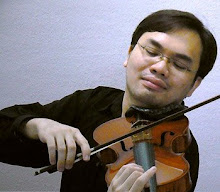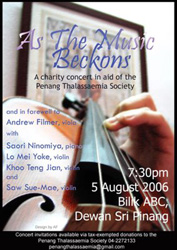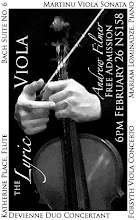The upcoming presentation - replete, if I might add, with a performance - will be of articulation in Bach's Brandenburg Concerto No. 6. This is an overview of the project, which was a component of producing the edition with Comus in the UK.
Some of us just cherish the idea that people like Mozart had everything perfectly ready in their heads and it was just a matter of putting pen to paper. Movies like Amadeus tend to create this superhuman image of the great composer, challenged only by the frustrating human confines of time and space, as it were. I am not sure if it is just that we enjoy the idea of the musical superhero - the idea of talent and of genius, and the idea that we of course need not compare ourselves to the level of Mount Olympus: not all of us are born a Hercules.
But at the end of the day, we're all on the same playing field. It's just that some run a whole lot further, and we have to think of this as inspiration rather than intimidation.
Mozart liked to shop. So do I. The idea that Bach made mistakes? Say it ain't so.
And mistakes in the 17th Century are far more interesting than those today, simply because Bach did not have the chance to just press the 'Print' button again. Even when they occurred at the start of a page, parchment was expensive, and in some cases it was necessary to just scratch out notes and write letter names for clarification:
Excerpt from the Prelude to the lute suite, BWV995
The examination of facsimiles of the manuscripts provide a singular experience in the process of research. As Robert Oliver said in regards to keeping in mind what Bach had in mind, and in reference to the manuscript: "That's what is so wonderful to sit and just look at what he wrote. That's his message to posterity. Everything he can tell is there somewhere."
The production of the Comus edition of the Brandenburg Concerto No. 6, while being primarily for the scordatura viola substitutions of the viole da gamba, provides an interesting look at the articulation markings. More specifically, it allows us a look into seeming discrepancies in the use of slurs - and how our attitudes towards these inconsistencies reflect our musical attitudes and presumptions.
Take for example this section (click on any image for an enlarged view in a separate tab):
Example 1
And the apparently "missing slurs" in this section:
Example 2
The problem of course is that we have no clear indication whether something is 'intentionally absent'. While we may treasure Henle for having pages which state "This page intentionally left blank to facilitate page turns", Bach did not have quite the luxury of saying "Don't add slurs here - it's just cooler this way".
And while I jest about Bach's coolness (though who would ever doubt Bach's coolness), it is indeed a remarkable compositional process called generic mixing. This is where a composer alludes to a different genre - or indeed, many different genres - within one work. Example 1 is within a minor modulation and it was basically a small interlude where a solo viola concerto was displayed ever so briefly. Sample 2 was within a quasi-fugal (some would prefer calling this 'imitative') section of some five instruments. Note that in this context, what some might consider to be 'missing' actually serves a purpose - in the parallel thirds that appear as part of that canonic process.
Example 3
This goes far beyond a two-instrument conversation:
Sample 4
Understanding these connections is important in preserving the intent, in my opinion. Take for example, this, from the one-time authoritative Bach-Gessellshaft edition:
Sample 5
which adds a "correction" to what is considered a missing slur (Viola 1, second beat), when this intentionally absent slur has the purpose of emphasizing the two-part quasi-fugal section:
Sample 6
Ironically, though we like to have this idea of the superhuman composer, we sometimes jump to conclusions when it comes to 'mistakes'.
The idea of internal variation is crucial in the appreciation of Bach, in my opinion, as the composer who basically took the simplest of ingredients and showed us how many flavours could appear. That perhaps is the true definition of "extraordinary": creating something remarkable out of something ordinary.














No comments:
Post a Comment